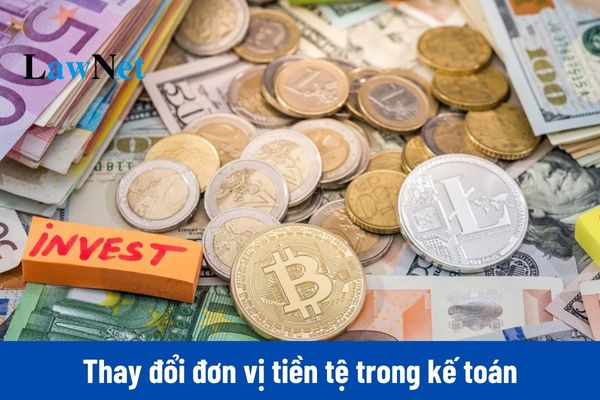When shall a notice of a change in the monetary unit in accounting be given to the tax authority in Vietnam?
What is the monetary unit in accounting in Vietnam?
Pursuant to Article 3 of Circular 200/2014/TT-BTC, the monetary unit in accounting is stipulated as follows:
"The monetary unit in accounting" is the Vietnamese Dong (national symbol is "đ"; international symbol is "VND") used for accounting books, preparation, and presentation of financial statements of enterprises.
In cases where the accounting unit mainly collects and spends in foreign currencies and meets the criteria stipulated in Article 4 of Circular 200/2014/TT-BTC, it may choose a foreign currency as the monetary unit in accounting.
When shall a notice of a change in the monetary unit in accounting be given to the tax authority in Vietnam?
According to Article 3 of Circular 200/2014/TT-BTC, the regulation regarding the change in the monetary unit in accounting is as follows:
Change in the monetary unit in accounting
When there is a significant change in management and business activities leading to the currency used in economic transactions no longer satisfying the standards mentioned in clauses 2 and 3, Article 4 of this Circular, the enterprise is allowed to change the monetary unit in accounting. The change from one accounting currency to another can only be made at the start of a new accounting period. The enterprise must notify the direct tax managing authority of the change in the monetary unit in accounting no later than 10 working days after the end of the accounting period.
Thus, in the case of a change in the monetary unit in accounting, notice must be given to the tax authorities no later than 10 working days after the end of the accounting period.

When shall a notice of a change in the monetary unit in accounting be given to the tax authority in Vietnam? (Image from the Internet)
What are regulations on selection of the monetary unit in accounting in Vietnam?
Based on Article 4 of Circular 200/2014/TT-BTC regarding the selection of the monetary unit in accounting:
- Enterprises primarily transacting in foreign currencies must refer to the accounting law regulations to consider and decide on the monetary unit in accounting and take responsibility for that decision before the law. When selecting the monetary unit in accounting, enterprises must notify the direct tax managing authority.
- The monetary unit in accounting is the currency:
+ Primarily used in the unit's sales transactions and services provision, having significant influence on the selling prices and typically the currency used for pricing and payment; and
+ Primarily used in the purchasing of goods and services, significantly affecting labor costs, materials, and other production and business expenses, usually the currency used to pay for these expenses.
- The following factors are also considered and provide evidence of the monetary unit in accounting of the unit:
+ Currency used to mobilize financial resources (such as issuing shares, bonds);
+ Currency frequently earned from business activities and retained.
- The monetary unit in accounting reflects transactions, events, and conditions related to the unit's activities. Once determined, the monetary unit in accounting should not be changed unless there are substantial changes in such transactions, events, and conditions.
How is the accounting currency used in tax accounting?
Pursuant to Article 7 of Circular 111/2021/TT-BTC, the regulations regarding the accounting currency in tax accounting are as follows:
- The accounting currency in tax accounting is the Vietnamese Dong, used for the recording of tax accounting books, preparation, and presentation of tax accounting reports.
- In cases where tax agencies, while performing tax management for taxpayers declaring and paying taxes in foreign currencies in accordance with the Law on Tax Administration and its guiding documents, must convert into Vietnamese Dong when collecting input information for tax accounting to record tax accounting books, prepare, and present tax accounting reports in Vietnamese Dong.
To be specific, as follows:
+ The exchange rate for the receivable amount when the taxpayer declares taxes in foreign currencies is the accounting rate regulated by the Ministry of Finance (State Treasury) at the time of accounting.
+ The exchange rate for the collected amount when the taxpayer pays taxes in foreign currencies is the accounting rate on the accounting document of the state budget revenue of the State Treasury transmitted to the tax authority.
+ The conversion rate for surplus payment in foreign currencies offset against state budget revenue or refunded by the state budget into Vietnamese Dong is the rate regulated at point a.5 clause 1 Article 25 of Circular 80/2021/TT-BTC and clause 4 Article 46 of Circular 80/2021/TT-BTC.

